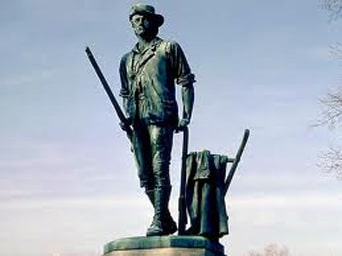by Bob Johnson

On this 4th of July we need to reflect on important ideas.
The bulk of the American people love to talk and feel “patriotic.” They never seem to tire of waving American flags and sticking “I support our troops” stickers on their vehicles. They feel these are signs of their patriotism. But what does the word patriotism mean? Does it mean the same thing to Americans today as it did to the people who struggled and fought to create the nation known as the United States of America? Perhaps, the founders and fighters who made certain the American Revolution was carried out successfully were more concerned with natural progress than they were with patriotism.
Webster’s Desk Dictionary defines patriot as: “a person who loves, supports, and defends his or her country.” Is that what George Washington and the other founders were doing, defending their country? Actually, they were not only not defending their country, they were actually attacking their country! At the time, the recognized government was Great Britain. By waging war against their country, Britain, America’s founders were anything but patriots by the standard definition!
The standard definition of patriotism played no part in the desires of America’s founders. What they were after was natural progress (not the current dogmatic liberal understanding of progress) which would create a better world. Only progress can bring about real positive change. Renaissance men like Thomas Jefferson knew, from observing other areas of life such as science and religion, that a conservative world-view is a stagnant world-view and an enemy to natural progress. Had, for example, history’s heroes like Galileo been content to adhere to the conservative teachings of the Church, mankind would not have made progress in both fields of science and religion. Likewise, the founders knew true natural progress could not be achieved by clinging to the established government. They knew real natural progress demanded revolution.
They also knew that revolution and the natural progress it brings requires sacrifice and, contrary to Ayn Rand, altruism. Ayn Rand, born Alisa Zinov’yevna Rosenbaum, is a darling of the money before people conservatives. One key idea in her philosophy of Objectivism is that altruism is bad and people should instead focus on their selfish interests. The 2008 collapse of the economy due largely to banksters and crooks on Wall Street doing just that should be enough for anyone to realize a giant gaping hole in Rand’s philosophy. Unfortunately it is not.
Recently a movie based on Rand’s book, Atlas Shrugged , was released. This novel and movie are intended to show the world what would happen if the leading industrialists (remember them, back when America lead the world in industrial production before Rand’s “Atlases” allowed the bulk of them to be moved overseas so the corporations could save cash while American workers were and are kicked to the street?) and other “leaders” went on strike. It’s interesting to note that one of the people Rand let preview her book while she was writing it is the former Chairman of the Federal Reserve, Alan Greenspan. Greenspan is responsible for a big part of the cause of the 2008 financial collapse.
In addition to the 2008 economic collapse, Rand’s attack on altruism is proven wrong by the American Revolution and all the people who took part in it. All of these people knew that the personal price of progress is very high. Yet, they were willing to risk their personal well-being and the well-being of their families for an ideal. And these heroes came from both the wealthy and the poor.
Many of our founders were wealthy established leaders in society. Ben Franklin, Thomas Jefferson, and George Washington were all very well off and financially secure in 1776. By today’s standards, they’d be considered to be on the lunatic fringe. They had everything they needed under the established system, yet, they wanted to destroy that system and replace it with a naturally progressive one whose benefits touched the lives of many more people. By waging war against the government, they not only risked losing all of their careers, income and wealth and the wealth of their families, they risked losing their very lives. If they failed or were captured/arrested, they would at best be hanged as traitors to the government, at worst, they would be hanged until close to death and then cut down to be drawn and quartered. Not many people in today’s money and career driven society would chose all those risks over material comfort, but, thankfully the founders did.
Another example is the Deist Thomas Paine. Paine was never wealthy until he wrote Common Sense which was instrumental in getting people to support taking up arms against the government. What did Thomas Paine do with his newly acquired financial wealth? He donated it to the Cause so mittens could be bought for the troops! Rand would think Paine was an idiot.
The rank and file supporters of the American Revolution show the errors of Rand’s anti-altruism philosophy, too. One shining example among thousands of shining examples is Isaac Davis (the famous statue of the American Minuteman, pictured below, is based on Isaac Davis) and his family. Isaac was a Minuteman from Concord, Massachusetts. On April 19, 1775 he received word to form-up with his troop as the government/British troops were on their way to confiscate their guns and ammunition. His wife wrote in her diary, “Isaac Davis was my husband. He was then thirty years of age. We had four children; the youngest about fifteen months old. They were all unwell when he left me, in the morning; some of them with the canker-rash.
“The alarm was given early in the morning, and my husband lost no time in making ready to go to Concord with his company. My husband said but little that morning. He seemed serious and thoughtful; but never seemed to hesitate. He only said, ‘Take good care of the children,’ and was soon out of sight.
“In the afternoon they brought him home a corpse. He was placed in my bedroom till the funeral.”
Ayn Rand and her greed-driven cohorts like Alan Greenspan aren’t worthy to even say the names of heroes for natural progress and freedom like Isaac Davis, Thomas Paine, George Washington, etc. These heroes are telling us that Rand is wrong. That true natural progress and liberty can only be won for a very high price. And winning takes much self-sacrifice and suffering. It’s up to each of us if we’re willing to pay it.

Bob Johnson is a freelance writer in the Tampa area of Florida. He was raised Roman Catholic, but after a stint in Marine Corps infantry and reading Thomas Paine’s The Age of Reason he became a Deist.
In 1993 he founded the World Union of Deists, and in 1996 he launched the first website devoted to Deism. He is the author of God Gave Us Reason, Not Religion, Deism: A Revolution in Religion, A Revolution in You and An Answer to C.S. Lewis’ Mere Christianity. He has also written the introduction to Thomas Paine’s The Age of Reason, The Complete Edition and Principles of Nature by Elihu Palmer.
ATTENTION READERS
We See The World From All Sides and Want YOU To Be Fully InformedIn fact, intentional disinformation is a disgraceful scourge in media today. So to assuage any possible errant incorrect information posted herein, we strongly encourage you to seek corroboration from other non-VT sources before forming an educated opinion.
About VT - Policies & Disclosures - Comment Policy



